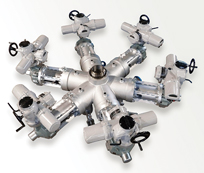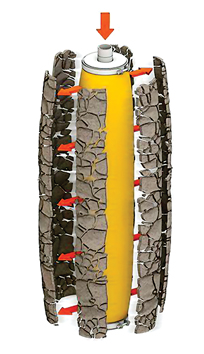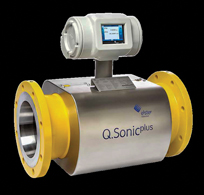New in gas processing technology
Bob Andrew, Technical Editor
NAESB 3.0 compliance for gas pipelines
Trellis Energy announced that the latest version of the Trellis 6.0 platform is the first to be 100% compliant with the North American Energy Standards Board’s (NAESB’s) Wholesale Gas Quadrant Standards version 3.0. NAESB is an industry forum that develops standards that lead to a secure and accountable marketplace for wholesale and retail natural gas and electricity.
While all interstate pipelines were required to comply with the revised standards beginning April 1, 2016, until the release of Trellis 6.0, there was no commercially available gas transaction management solution fully compliant with the latest NAESB standards.
Over the course of the last year, Trellis worked with a number of multinational pipeline operators to develop a compliant platform. Initially implemented for a FERC-regulated pipeline in the first quarter of 2016, Trellis is now offering the solution as part of the commercially available Trellis platform.
Among other changes, updates to the NAESB standard include a requirement that natural gas pipelines add an intraday nomination cycle to help synchronize all interstate gas pipelines. This means that pipelines will now have to confirm and schedule five times per day instead of four times.
Trellis 6.0 helps pipeline companies become compliant with the newest standards and avoid these fines by updating the rules governing the web-based platform. In addition to compliance with NAESB 3.0 standards, Trellis’ 6.0 platform offers:
- An integrated information-posting website. Trellis 6.0 introduces an information-posting website unified within the platform management console.
- A built-in electronic data interchange (EDI) platform. Integration with third-party systems and trading partners is made even easier with an EDI platform built into the Trellis software.
- Additional improvements across various modules such as contracts, nominations, scheduling, and allocations.
Intelligent actuation for seven-way control valve

Rotork Japan has supplied IQ3 intelligent valve actuators for the automation of what is said to be the world’s first seven-way control valve. The valve, manufactured in Japan by Aska Corp., operates under high pressure to control and regulate the flow of chemicals such as polymers, reducing the load on instrumentation in the downstream manufacturing processes.
The radial design of the valve eliminates any dead space (no-flow) areas that could erode the quality of the media. The design demands a compact actuation solution that is capable of delivering swift and precise valve movements with high operating torques. The high viscosity, temperature and pressure of the media being controlled are further factors that contribute to the challenging demands of the application.
The selection of Rotork IQ3 intelligent actuation for the automation of the valve has successfully fulfilled these challenges. The long-term reliability of the IQ3 in similar harsh and high-temperature hazardous-area environments made an important contribution to the valve maker’s decision to specify Rotork for this application. Other significant considerations included the IQ3 actuator’s versatility, functionality and asset management capabilities, combined with swift and simple commissioning procedures, accessed via secure, non-intrusive communication technology.
Efficient reclamation of glycol from natural gas

In the efficient and environmentally friendly operation of gas pipelines, the recycling of glycol is playing an ever-increasing role. BHS-Sonthofen has developed a new process that recovers significantly more glycol than previously used processes, at a lower cost. It requires little maintenance and works fully automatically, making it suitable for offshore operation.
Divalent salts are precipitated in the first step of monoethylene glycol regeneration. The solid matter is subsequently removed from the glycol. Various systems are used for this solid-liquid separation, depending on the location of the treatment plant. For example, static thickeners (sedimentation tanks) are frequently used in onshore regeneration plants. In the offshore sector, however, reversible flow or cartridge filters, equipped with depth filtration elements, are often used. They generate high operating costs, with an increasing saline load.
Filtration and washing. To further reduce the residual glycol content and to be able to offer compact and low-maintenance systems, BHS has developed a new, two-stage treatment technique that works without precoating. The suspension is thickened with candle filters in the first stage, and then further treated with a horizontal leaf filter.
In the first stage, the suspension is filtered in BHS candle filters of the “CF” type without filter aids, and is pre-thickened. Next, the suspension arrives at a BHS horizontal leaf filter from the “PF” series. The advantage of the horizontal leaf filter compared with a candle filter is the arrangement of the filter surfaces: The filter cake is built up on virtually horizontal filter plates instead of on vertical candles. As a result, the glycol can be displaced with water without the danger of the cake slipping off.
After washing, the filter cake is dried, shaken off the plates and then discharged from the filter housing. The final product is crumbly and has a low volume. Apart from precipitated salts and water, it contains very little glycol, so it can be safely disposed.
Another advantage of the two-stage process is that the precoat material no longer has to be purchased and handled. The compact design means that the new systems are suitable for offshore platforms, because the footprint is a critical factor. BHS is said to be the only manufacturer to offer complete systems that combine two filter stages with candle and horizontal leaf filters and washing.
Lower costs. The new system with two stages provides operators with additional benefits that extend beyond the current state of the art. They reduce the glycol consumption and lower costs (e.g., for capital, consumables or maintenance work). The cost analysis for a typical system shows that approximately 70% of investment costs for a single-stage system are required for the two-stage execution. The new system also cuts the use of consumables: Filter aids are completely dispensed with, and the loss of MEG is reduced by a factor of 30. Altogether, the overheads of the new two-stage system amount to only 20% of the single-stage system with precoat.
Efficient reclamation. The single-stage process with BHS candle filters is operationally reliable and has already recovered more glycol than with previous methods. For years, the process with the protective precoating has worked very reliably. The new two-stage process with the combination of candle and horizontal leaf filters further increases the efficiency of the reclamation. In addition, cost savings on consumables, especially filter aids and glycol, can be realized with lower investment costs.
New midstream natural gas measurement portfolio

Honeywell Process Solutions (HPS) launched its new measurement portfolio for the midstream natural gas sector. The portfolio is designed to provide reliable and accurate volume and energy value measurement across a wide range of applications, while helping cut operating costs by up to 70%.
Honeywell’s midstream gas measurement offering brings together three products:
- TwinSonicplus, a two-in-one ultrasonic gas meter that delivers operational integrity for custody transfer measurement. It combines a Q.Sonicplus ultrasonic meter with an additional independent measurement for verification in the same body for greater efficiency and more reliable operations. A patented six-path configuration for the primary measurement provides flow profile measurement, noise immunity, and pressure and velocity abilities. In-built verification reduces risk while saving users up to $50,000 for each meter, against using two meters in series.
- Encal 3000, a gas chromatograph designed for natural gas energy measurements to deliver accuracy and low running costs. Using micro-electro-mechanical systems (MEMS) and capillary columns, it delivers repeatability and compositional accuracy to enable users to improve both heating value and volumetric (via compressibility) custody transfer measurements. Optimized for varying shale gas compositions, the EnCal provides gas composition measurements from < 900 Btu/scf to > 1,150 Btu/scf using a single, moderate BTU calibration gas.
- GasLab, an online gas quality analyzer that provides continuous analysis of natural gas calorific value, Wobbe index and methane number to optimize billing, efficiency and emissions. It provides a solution for operations and emissions that are adversely impacted by fuel quality variations. Requiring no routine maintenance and having the ability to reduce OPEX by up to 70% against gas chromatographs and calorimeters, the GasLab supports a wide range of uses: natural gas feedstock blending, point-of-use custody transfer, real-time quality control of the fuel mix for gas turbines in power plants, and improved combustion control.
Portable flue gas analyzer
AMETEK Land, an industrial combustion efficiency and environmental pollution monitoring specialist, has enhanced its Lancom 4 Portable Gas Analyzer to improve usability. The software, Insight, allows users to interface with a PC for remote control and data logging. Insight offers graphing and analysis tools for data visualization and reporting, and it now includes “wake” and “sleep” functions. Lancom 4 is claimed to be a versatile, accurate portable flue gas analyzer for checking or testing. It can monitor up to nine different gases and a total of 17 measurement parameters with one instrument, as well as data-log up to 250,000 records. A rugged carrying case, which ensures that the instrument is protected at all times when in use, is also now supplied as standard at no extra charge.




Comments